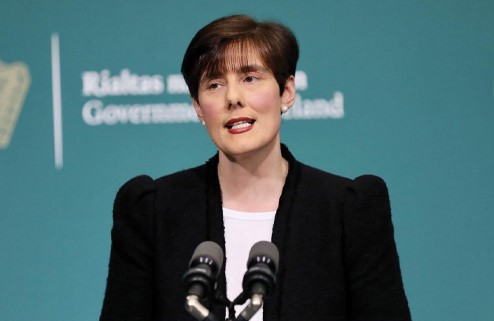Minister for Education Norma Foley has told Cabinet that she will bring forward plans that will encourage parents to avoid buying smartphones for children in primary schools.
The move will see guidelines issued to all primary schools across Ireland in a move that Government claims will “keep children safe and healthy.”
The plan is based on the example of eight primary schools in Greystones, Co Wicklow, where parents made a collective agreement not to buy smartphones for their children while they are enrolled in primary school.
Foley’s proposals have been met with a mixed reaction, with Fine Gael Senator Mary Seery-Kearney, who has long been pushing for the move, saying the proposal was “excellent.”
“The guidelines will be instrumental in providing a framework for schools and parents associations to canvass the views of parents and assist them in subscribing to a no smartphone policy,” she said.
“Smartphones are a fantastic utility that assists us in modern life, however, they must be used with maturity and care and children do not have the maturity to discern what is healthy and what is damaging on phones. Unsupervised use can lead to children being exposed to influences and material that is deeply unsuited to their age,” she said.
She remarked “children also do not need the politics of the Whatsapp group at tender vulnerable ages” and there was a need to protect children from cyberbullying.”
“Through our smartphones, we have the world at our fingertips and that brings positive things, but also negative things. Smartphones facilitate information and freedom of expression, but also misinformation and sometimes damaging and corrosive lies. How are children to discern the difference? This process will facilitate a conversation and awareness that all is not good when it comes to smartphones – that maturity and care is needed in their use.
The Dublin Senator said there were other points to consider, citing The Netherlands introducing a ban on phones, tablets and smartwatches in all classrooms from January 1st, with exceptions granted for devices required for lessons, medical reasons or for people with disabilities.
“Childhood is precious and all the more fleeting now. We have a duty as parents, guardians, teachers and legislators to provide as safe a space as we can for children,” she said.
Labour TD and education Aodhán Ó Ríordáin was more sceptical of the proposal, stating “it’s not worth the paper it’s printed on.”
Dubbing the move “classic Fianna Fáil PR spin,” Ó Ríordáin asserted the proposal was an attempt to “distract from the myriad of failings in the Department including the dearth of teachers available, particularly to cover maternity posts.”
“Rather than tackling on the real issues, on the things that parents actually care about, the Minister is investing time in issuing meaningless guidelines – it is outrageous.”
Ó Ríordáin pointed to a survey by the INTO that showed 800 vacant teaching posts nationwide and projects an additional lack of 1,200 positions in the coming years.
“Schools are being forced to plug staffing gaps with special needs assistants and unqualified staff. Why doesn’t the Minister focus her energy on addressing this crisis instead?”
Dubbing the smartphone guidelines as “meaningless,” he said that without the proper resources allocated to the education system, the guidelines will be ignored by teachers and parents.
“Teachers are too busy trying to keep up with the real, practical needs of their pupils. It’s an insult to them and to us all.”
